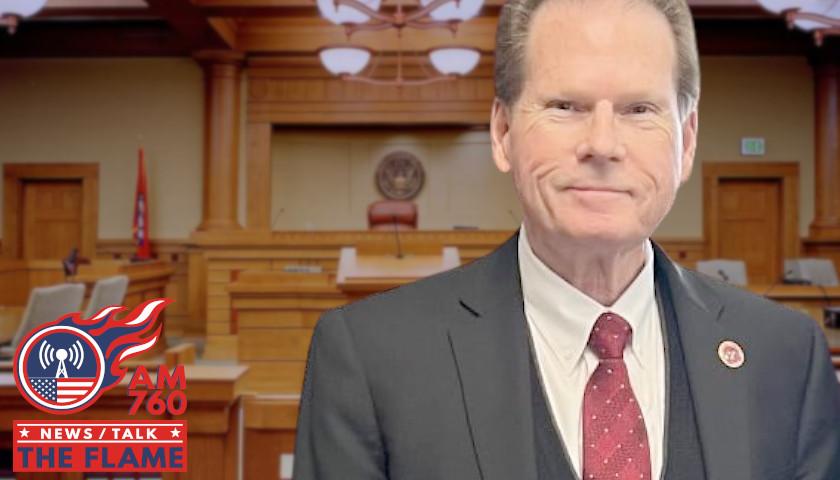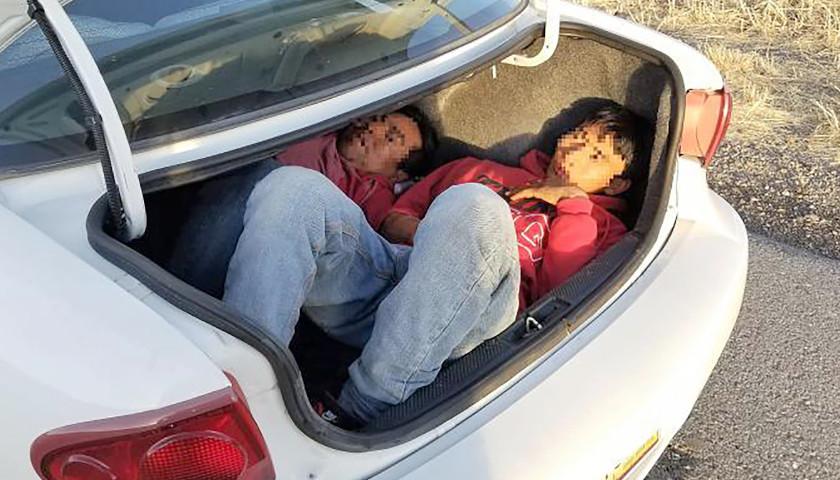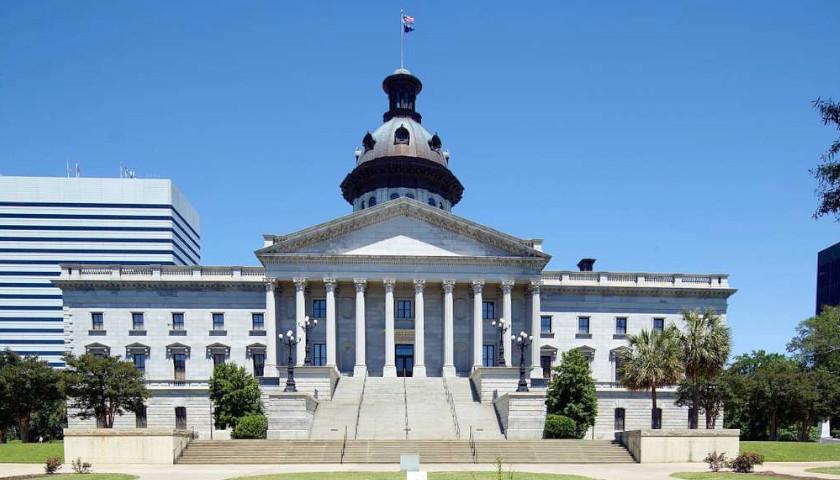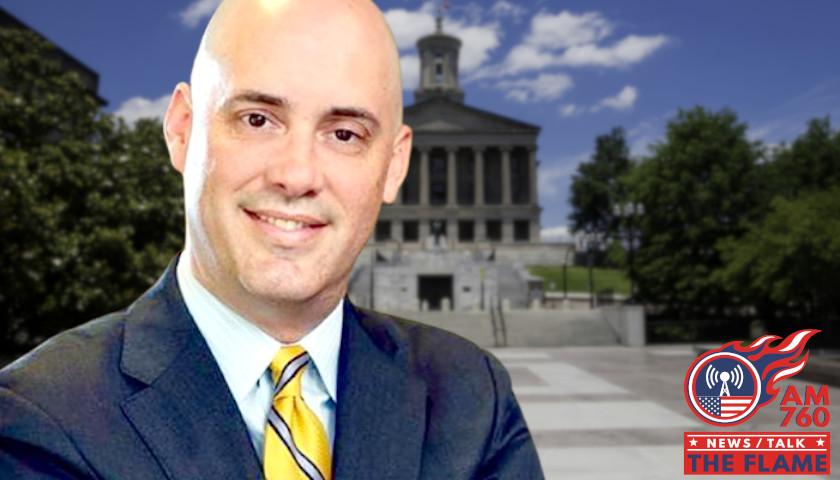State Senator Joey Hensley (R-Hohenwald) joined The Tennessee Star Report with Michael Patrick Leahy in-studio on Thursday to discuss new allegations by a group of out-of-state companies that say they are owed for taxes they paid to the tune of more than a billion dollars. The companies’ claims stem from a 1932 law that applies a different formula to in-state companies versus firms located outside of Tennessee.
TRANSCRIPT
Michael Patrick Leahy: Good morning, Nashville. It is 11:05 a.m.
We are, in fact, broadcasting live from our studios in downtown Nashville, a stone’s throw from the Tennessee State Capitol.
And we are delighted to welcome to our studios right now someone who was in session earlier today, a stone’s throw from where we are right now.
My very good friend and my state senator. That’s right: State Senator Joey Hensley.
State Senator Joey Hensley: It’s good to be with you, Michael. Good morning.
Michael Patrick Leahy: Good morning.
And just for our listeners: your district includes a little tiny sliver of Williamson County.
State Senator Joey Hensley: It does. It includes Spring Hill in Williamson County, as well as Murray County, Giles County, Marshall County, and Lewis County. But yes, it includes all of Spring Hill.
Michael Patrick Leahy: You are a medical doctor, and you’re from Hohenwald.
State Senator Joey Hensley: Hohenwald, yes.
Michael Patrick Leahy: You still have a practice there.
State Senator Joey Hensley: I still have a practice there after many years, so. That’s my hometown. I’m one of the few doctors that have gone back to their hometown to practice and I’ve been there 37 years practicing and I still practice. I’ve cut back some, but still there when I can.
Michael Patrick Leahy: Well, the big news is, of course, the Tennessee General Assembly has convened.
State Senator Joey Hensley: That’s right.
And you’re in the State Senate. There are 33 members of the State Senate.
State Senator Joey Hensley: 33 members, that’s correct.
Michael Patrick Leahy: And it’s what, 29? Republican; six Democrat?
State Senator Joey Hensley: 27 Republicans; six Democrats.
Michael Patrick Leahy: Oh, I’m sorry. My math was 27.
State Senator Joey Hensley: 27; six.
Michael Patrick Leahy: Thank you.
State Senator Joey Hensley: That makes 33.
Michael Patrick Leahy: Says the medical doctor who passed mathematics. Well done.
Now; so, there’s one little thing that just happened recently that, and this is sort of a breaking story.
What I’ve heard is that there’s this little quirk in the franchise excise tax law and that quirk has been made public by apparently some lawsuit or something that’s being settled.
But people who’ve been paying the franchise excise tax for decades, apparently, are owed some money by the state, and that the governor has a bill to address that problem.
Am I in the right neighborhood?
State Senator Joey Hensley: Yes. And just to familiarize people with the franchise excise tax. That’s a tax that businesses, corporations, and LLCs pay the state, and it’s based on property as well as income, profit. And those are different measures people use to generate how much franchise excise tax that they have to pay and the state’s income – about 30 percent of it comes from franchise excise tax.
This law has been on the books since 1932, but there are some companies that are out-of-state companies that have found a loophole in the law that constitutionally, they say that we have been treating out-of-state companies differently than we treat in-state companies. And they claim that they have paid more franchise excise tax than they should have, compared to what in-state companies pay.
So that’s something that our attorney general has looked at. There’s several of these companies – and I don’t know all of the details about it – but here there’s 70 to 90 different companies that have brought a suit against the state and sent the governor a letter and said that we think the state owes us so much money, even though this has been on the book since 1932. But they can only go back three years, and so we may be liable to pay some of these companies money back over the last three years if it is determined that they have overpaid what they would have owed otherwise.
And then the governor’s looking at bringing legislation that would change the law so that it would make it constitutional. So, and this is something that we just found out over the last couple of weeks. And this could be up to a $400 million expense for our budget going forward, which would mean that we would lose that much money yearly. So we would have to account for $400 million.
And that’s not to count how much money that these companies may be owed in their overpayment. So that’s yet to be determined, but I understand that could be several hundred million dollars as well.
So we are looking at legislation, and I haven’t seen the legislation yet, even though I’m chairman of the Revenue Subcommittee and the Finance Committee.
I’m on the Finance Committee and our Revenue Subcommittee, which I’m chairman of handles all the tax legislation, has to come through that subcommittee. So that would come through that committee, but that’ll be legislation the governor is proposing to file.
So we still don’t know all of the details, but probably would be something that would make out-of-state companies base their payments on the same things in-state companies do because the bill in the past has, if people own property in the state, they got to count off some of that property and companies that did business in the state, but might not have owned property, didn’t get that same break. So they’re looking at details of our law like it is, and like I said, the law has been on the books since 1932.
And somebody is just now looking at it and understanding that maybe it does favor in-state companies more than out-of-state, but we’ll just have to see.
But the attorney general is looking at it, and I believe – I don’t want to put words in anybody’s mouth, and I haven’t spoken to the attorney general personally – but he’s looking at it, and the state’s looking at the governor – and so we may have to have legislation that would fix that if that is determined to be an actual problem.
Michael Patrick Leahy: So, also, in theory, if it is the case that these out-of-state companies have a legitimate claim, then they would be owed, what, for three years of this backwards?
State Senator Joey Hensley: They can go back three years, yes.
Michael Patrick Leahy: So that could be as much as like $1.2 billion if it’s 400 million a year
State Senator Joey Hensley: Somewhere in that range. It could be. And even though the law has been on the books since 1932, but they can’t go back to 1932, but they can go back three years.
Michael Patrick Leahy: Now, what’s interesting to me about this is, I think I’ve heard of these same companies, these out-of-state companies, in other states, have found the same problem.
Have you heard that? In those other states?
State Senator Joey Hensley: I have not heard that, but that, I would I would think that that would be an issue, yes.
Michael Patrick Leahy: I think these out-of-state companies have some very clever lawyers.
State Senator Joey Hensley: Yes, oh yes, they have clever lawyers. And, of course, every state has different tax structures. We don’t, a lot of states have a state income tax, and they generate a lot of their money from the state income tax.
And, of course, we’re one of the seven states that do not have a state income tax. So we generate a lot of our state revenue does come from the franchise excise tax from businesses and then a big percent comes from the sales tax.
Other states may have a different formula where they figure the franchise excise tax.
Michael Patrick Leahy: How much of a hole would this put the state’s budget in if this turns out to be the worst-case scenario?
State Senator Joey Hensley: Worst case scenario is probably about 400 million going forward.
Michael Patrick Leahy: Going forward and then we got to pay him back for three years.
State Senator Joey Hensley: And then pay them back for three years.
Michael Patrick Leahy: Well, that’s survivable. We’ve got, what, $29 billion in cash reserves right now, something like that?
Well, you’d know better than I.
State Senator Joey Hensley: Our Rainy Day Fund is about $2.1 billion.
Michael Patrick Leahy: Rainy Day Fund. Okay.
State Senator Joey Hensley: Rainy Day Fund.
Michael Patrick Leahy: Got it.
State Senator Joey Hensley: $2.1 billion.
Then there’s a TennCare Reserve that’s about a billion dollars. But we have the Rainy Day Fund $2.1 billion – that’s the highest that it’s ever been. We just put $250 million more into it last year.
And over the last few years when we’ve had these budget surpluses, we’ve added to the budget. Rainy Day Fund. So we do have that.
Plus, we have about a $2.2 billion surplus going forward, so the state certainly could pay that. And now if we have to make some kind of settlement, I don’t know if that would have to be over one year, we may be able to spread that over several years.
Michael Patrick Leahy: See, if it’s me, I go to these guys, if they’ve got the goods, let’s assume that – I would go to them and say, ‘Well you got us guys, now let’s be nice, and we’re going to pay you out over time.’ That’s what I’d do.
State Senator Joey Hensley: Well, that’s certainly the best thing to do because we don’t want to pay a big lump sum because the state has other expenses and other things going on.
But we’ve been fortunate in Tennessee because of our fiscally responsible governing, I think. Over the last few years, we’ve had budget surpluses.
In the last couple of years, we’ve paid a lot of one-time expenses with recurring money. So even though we spent on a lot of capital projects over the last couple of years, but that was one-time money, but we used recurring money.
So that money was spent last year, but it’s coming up again.
Michael Patrick Leahy: When we come back, we’ll have more with State Senator Joey Hensley.
I have a particular bill or report that you were part of about the sending money back to the Feds on education. I’d like to talk about it.
The report had a set of conclusions, which were not necessarily the ones that I would like the most, but we’ll talk about that and more with State Senator Joey Hensley.
We’ll be right back. This is The Tennessee Star Report. I’m Michael Patrick Leahy.
– – –
Listen to The Tennessee Star Report weekdays from 11:00 am – 1:00 pm on WENO AM760 The Flame.
Photo “Joey Hensley” by Joey Hensley.






How many of those same companies benefited from the “Economic Development” scheme that brought them here? Perhaps this is simply another way of getting more money from taxpayers to fund political campaigns.
Why haven’t we heard this from our “leader”…. Bill Lee…